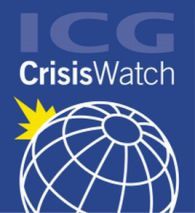 The
latest report from the International Crisis Group, warns that the country’s future remains deeply uncertain. The death of President Malam Bacai Sanhá on 9 January 2012, inter- and
intra-party competition, the manipulation of inter-communal tensions and of army factions are challenges the political parties have to overcome. Security sector reform (SSR) is pending,
while the March and June 2009 assassinations of President Nino Vieira, armed forces Chief of Staff Tagme na Wai and two senior politicians still generate rumours, accusations and
threats.
The
latest report from the International Crisis Group, warns that the country’s future remains deeply uncertain. The death of President Malam Bacai Sanhá on 9 January 2012, inter- and
intra-party competition, the manipulation of inter-communal tensions and of army factions are challenges the political parties have to overcome. Security sector reform (SSR) is pending,
while the March and June 2009 assassinations of President Nino Vieira, armed forces Chief of Staff Tagme na Wai and two senior politicians still generate rumours, accusations and
threats.
“State reforms, favourable economic conditions and significant donor support have slightly improved the economic situation and strengthened police and justice capacities”, says Vincent Foucher, Crisis Group’s Senior Analyst for West Africa. “But structural reforms to reinforce the state and foster development, especially as regards SSR, represent another major challenge”. In the wake of the overthrow of armed forces Chief of Staff Zamora Induta by his deputy António Injai and the brief arrest of Prime Minister Carlos Gomes Júnior on 1 April 2010, tensions between the president’s and the prime minister’s camps, both members of the Partido Africano da Independência da Guiné e Cabo Verde (PAIGC), have diminished.
The country still faces daunting challenges, among them: the forthcoming PAIGC congress and its factionalism; the early presidential elections on 18 March 2012; the legislative elections scheduled for the end of the year; and local elections – to be the first in the country’s post-colonial history. The future of the marginalised opposition hangs in the balance as it is tempted by radicalisation. Prospects for the army also remain uncertain. Can the scheduled demobilisation of 2,500 soldiers be implemented? Will the military obey the civilian leadership now that the latter has fulfilled its obligations toward the former? Have the Angolan military presence and the likelihood of a more robust international intervention really changed the perspective of army leaders?
The Angola-backed domination of the prime minister and the army chief of staff must work to end drug trafficking – in which senior officials are still thought to be involved – and impunity. An efficient bureaucracy and credible, significant checks and balances are urgently needed. Long-term training and capacity building of the political parties are particularly important, as is investing more in human development. Regional and international actors should keep a critical eye and carefully monitor the concentration of political and economic power by the elite.
“Concerns about Angola’s growing lead in Guinea-Bissau, particularly from other West African countries such as Nigeria and Senegal, delay and weaken the international support for reform”, says Gilles Yabi, Crisis Group’s West Africa Project Director. “It is essential that all relevant governments reach a real agreement on the substance of their involvement in the country”.
Source: http://www.crisisgroup.org/en/publication-type/media-releases/2012/africa/beyond-compromises-reform-prospects-in-guinea-bissau.aspx

/image%2F0994931%2F20220514%2Fob_0ba45b_picture-interview2.jpg)